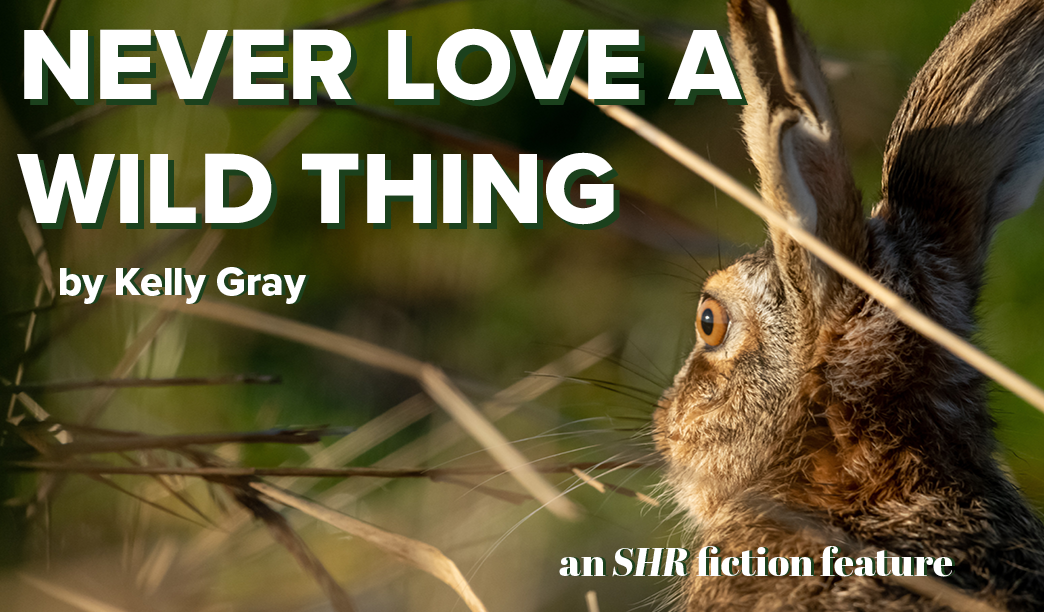We met during The Year of Beetle. Everyone was past worried at that point. I had lost all my hair, but it was beginning to grow back, somehow darker and thicker, like it had seen something in the underworld of bald that it didn’t like and came back kicking in long waves. The first tufts started up during harvest season. By autumn, it was all back. The season had been long on the farm, humidity that was hands-around-your-throat-uncomfortable, underpaid nights with flashlights waiting for the beetles to descend, dragging my haul across the sand, waiting to have it weighed. The beetles smelled like metal, but they were light and sounded like scratch against burlap. Each bag was sprayed down, then dumped into the truck. We were paid as dawn inched up. There was usually enough time to hitch back to Camp and walk home before the sun scorched the shit out of my pink head.
I would tie up a beer in the creek by my house each evening before work, and by the next morning, it would be almost cold. The direction I took home was determined by my desire to avoid bird-sized mosquitos and the raccoons, who would be figuring where to sleaze out for the day. I did not like walking under the Raccoon Tree, the mama raccoons thick bodied and intent on teaching their sideways walking babies to swipe at every passerby. I hung left to take a trail that ran up beside a set of houses clumped together, sharing one fence interrupted by separate gates for each residence. The pathways were overgrown but straight where everything else tilted. Each structure looked the same, tucked between trees tall enough to be singed by July, front porches with washing machines and dryers left out as storage containers. From each eave hung the obligatory decorative cage filled with beetles humming, creating that sweet dust.
That's where I found Ace. Ace with shoulders popping out of her crop top like baseballs. Ace with a trucker hat on sideways like she isn’t even trying to be pretty. Ace with knees bleeding. Ace with a baseball bat leaning against her busted screen door. Ace balancing on a ledge, always, looking like an announcer. Legs like some invisible doctor is always tapping her knees for reflexes while she’s waiting to get called off the bench. Ace chewing slang. Ace with a chin that only tilts up. Even in bed, I would later find out, Ace fucking you like you are the last base in her home run.
I guess I thought Ace would either have a special interest or a full-on rejection of beetle dust. I was partial to it that summer, the way it would ease my stomach and reduce the burn along my ears, maybe leave my exposed neck less like red crepe paper and more like skin. It wasn’t until we had shacked up together that Ace confessed. She was neutral about beetle dust, a rare moment of what she called the nice-complex, when folks turn on their pleasantries to avoid small moments of conflict or truth telling. Neither this nor that, just a polite smile, maybe almost too many teeth, but not detectable enough to be turn-away-creepy.
I didn’t tell Ace that the whole summer she was nicing on me, but she was. She would take the beetles from my hands, let them crawl up her arms. When they died, she glued their bodies to her bike, in a circle around her cracked light and up and down the tubes. By the end of the summer, her bike was covered in iridescent wings and thoraxes. Jars of beetle dust were carefully stowed away against the mirror of her grandmother’s vanity. When we left, it was the only nostalgic thing she took with her.
She said, Sam, this is a pause. The rabbit was listening.
And its life after that? Gone. No tracks, no movement. Ace wove a story into the air. A great horned owl had slid down the wall of night, hooked into shoulder flesh, then used its great wings to push back up toward the treetops, the jackrabbit in its grip, stunned.
I started writing Ace one sentence love letters. It felt too much to ask her to read a paragraph, to expect her to think of me as more than a page. The authors she carried in her backpack seemed to be behemoths of her own making: Doris Lessing, Don DeLillo, Roberto Balaño. I thought of them like that too, curled up and writing only to her while she traversed Camp on her bike or leaned up against my bedroom wall. All those writers strewn on the ground, watching her briefs come off as they turned out page after page for her to consume. Me, I wrote in bursts on tattered scraps:
Ace looked at the drawing for a long time. She held the plastic jar to the light, tilted the thick fluid. She was in bed, naked. I felt awkwardly human in her presence. My clothes weighed heavy, my belt rope tied too tightly around my waist, my skin hot and bathless, caked. My burns showing.
No, she said. I don’t want this, Sam. I don’t want to stay here where it started. She moved her hand against the space I had taken for our world, then let her wrist flop, palm up in irritation.
Between her pillows, the baby opossums made a swirl of pink and veined ears. She nuzzled her face to them, and they took to her head, one wrapping its length around the back of her neck. She looked at me flatly, as if I had already faded into the past. The baby opossum peeked through her hair, opening its mouth in faux threat.
Ace with a bat. Ace with a bike. Ace with beetle medicine. Ace with a cool beer and broom at the creek bed. Then, Ace with a bag. Ace with a car. Ace with a map. Ace made decisions with her shoulders, her arms moving like wheels through her physical world. Her chin tilted up.
I sat at the creek bed, imagining my body burning flat into the brittle understory of the exposed forest floor. I imagined screaming. My voice would crack and pitch high, expose my repulsive desire. My soft body. A quaking was taking up my lower back, moving me back and forth in the small space of me. I thought of my mama, the dirt covering her face, her open mouth. I became a metronome as my fingers dug into the mud. Pulse, pulse, pulse. I rocked until I was steady again. I thought of the jackrabbit, the pause. I thought of Ace taking me, stunned.
Ace cut across the ugly, hauling two briefcase-shaped cages full of baby opossums. She walked don’t-stop-me-quick. A tent door opened. I could see a man on his knees looking up, his face contorted as he took one of the cages from her extended hand. He crawled out, led her into the bathroom. When they came out, he was carrying a canister. I couldn’t hear either of them from the car, if they talked at all. When she got back in, she simply explained we had gas. As we pulled away, the man was walking the cage toward the barbecue pits. Ace turned her face sharply in the other direction. The remaining babies poured out into the car, across our laps, and one, back into its place along her neck, under her hair.
Ace pulled off the highway onto a narrow road that led to what used to be an edge. She parked, and we left the doors open, stepping into the imprint of a lake. Gray sand cracked beneath our feet. I imagined a canoe. A sharp longing for that specific pace of travel met the bright light of day. I squinted into want. To propel oneself with wood and metal across water, a convergence of elements made peaceful. My walking felt forced.
The lake had long ago left for the sky. At the center of this nothing-place, pelican skeletons were strewn about, maybe thrown down, a possible exchange between land and atmosphere. Each bird had lost form until it was its own barest shape. Dusted in glistening salt, bones crystalized against split ground. Ace came over to where I was standing.
Can you hear them, she asked.
I closed my eyes. I imagined them first with muscles. Can you see it, she asked.
All the fleshy pink and red, and the eyeballs placed back in the skulls. Emerging feathers, belly first, then the wings. Bird faces started to move, beaks clapping at the clouds, the webbing of their feet coming back.
Sam, Sam, she cooed my name, taking my hands.
We began to spin, my eyes still closed. Pelicans resurrected. Water coming up till we were knee deep, fish between our legs, in their pouched throats. I wanted to open my eyes, to tattoo the great birds across her chest. Driftwood was floating past, then a canoe.
Her hands slipped suddenly from my body. I opened my eyes to see Ace walking back toward the dock. I looked past the car to where the road blurred into horizon.
We spent the night driving north, our world of asphalt contained by the reach of headlights. I could have touched her hand for confirmation that we were side by side, but I knew Ace was ahead of me. I knew that if I looked at her, I would see Ace peeling her lips back, licking that highway, her eyes on something that wasn’t me. Ace hungry. Ace driving like I wasn’t in the car. Ace spitting.
CURRENT ISSUE
|
CONTACT
|
DEPARTMENT OF ENGLISH
|


